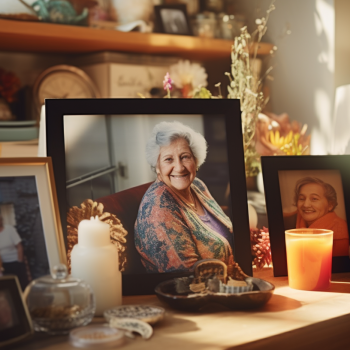Key Takeaways
- SonderCare is a healthcare company dedicated to improving the quality of life for those in need of home care, specifically through their premium hospital beds.
- The company offers a variety of hospital beds, each designed to meet different needs, including the Aura Premium Hospital Bed, Aura Extra Wide Hospital Bed, Aura Platinum Hospital Bed, and Aura Platinum Wide Hospital Bed.
- SonderCare’s hospital beds are designed with comfort, safety, and dignity in mind, and they blend seamlessly into any home environment.
- In addition to their products, SonderCare provides excellent customer service, including installation and setup services, as well as ongoing support to ensure users get the most out of their products.
Dementia can be a very challenging and distressing experience for both the individuals living with dementia and their caregivers. Therefore, it is essential to provide individualized care that caters to the unique needs and preferences of each person.
The importance of individualized care in dementia treatment cannot be overstated. Every person living with dementia is different and may have varying symptoms, abilities, and preferences. Personalized care takes into account these individual differences and tailors the treatment approach accordingly. This approach recognizes that what works for one person may not work for another, and it ensures that the care provided is effective and meaningful.
The impact of personalized care on patient outcomes is significant. When individuals with dementia receive care that is tailored to their specific needs and preferences, it can improve their overall well-being and quality of life. Personalized care can help manage symptoms, reduce agitation and anxiety, promote cognitive functioning, and enhance social engagement. It also fosters a sense of dignity, autonomy, and personhood for individuals with dementia.
The Significance of Personalized Care in Dementia Treatment
When it comes to dementia treatment, personalized care plays a crucial role in providing the best possible support for individuals living with this progressive condition. Understanding dementia as a progressive condition allows caregivers to anticipate and address the changing needs and challenges that arise over time. Tailoring care to individual needs and preferences ensures that each person receives personalized attention and support, promoting their overall well-being and maintaining their dignity throughout the course of their journey with dementia.
Understanding Dementia as a Progressive Condition
Understanding dementia as a progressive condition is crucial in providing personalized care for individuals affected by the disease. Here are three key points to consider when understanding dementia as a progressive condition:
- Challenges in dementia care: As dementia progresses, individuals may experience cognitive decline, memory loss, behavioral changes, and difficulty with daily activities. This presents unique challenges in providing adequate care and support.
- Innovative approaches in dementia treatment: Recognizing dementia as a progressive condition has led to the development of innovative approaches in treatment. These include person-centered care, cognitive stimulation therapy, reminiscence therapy, and music therapy, among others.
- Tailoring care to individual needs and preferences: By understanding dementia as a progressive condition, personalized care can be tailored to meet the specific needs and preferences of each individual. This includes adapting the environment, creating routines, providing meaningful activities, and fostering a supportive and compassionate approach.
Tailoring Care to Individual Needs and Preferences
Individualized care is crucial in dementia treatment as it allows for the tailoring of care plans to meet the specific needs and preferences of each person affected by the disease. Taking an individualized approach to dementia care acknowledges that each person’s experience with the disease is unique and requires personalized attention. By adopting a person-centered care approach, caregivers can create a supportive and empowering environment that promotes the individual’s well-being and quality of life. This approach involves actively involving the person with dementia in decision-making, respecting their choices, and understanding their preferences. By understanding their specific needs, preferences, and abilities, caregivers can provide personalized care that addresses their physical, emotional, and social needs. This individualized approach to dementia care not only enhances the person’s quality of life but also fosters a sense of dignity and autonomy, promoting overall well-being.
Benefits of Personalized Dementia Care
Personalized dementia care offers numerous benefits for both patients and caregivers. By tailoring the care to the individual’s specific needs and preferences, it enhances their quality of life and promotes a sense of comfort and familiarity. Additionally, personalized care can effectively reduce behavioral symptoms and agitation, leading to a more peaceful and stable environment. It also plays a crucial role in improving the emotional well-being of both patients and caregivers, fostering a deeper connection and understanding between them.
Enhancing Quality of Life for Patients
The implementation of tailored care approaches in dementia treatment significantly contributes to the improvement of the overall wellbeing of patients. Personalized dementia care goes beyond just medical treatment and focuses on enhancing the quality of life for individuals living with dementia. Here are three key benefits of personalized dementia care:
- Improving Communication Skills: Personalized care takes into account the individual’s unique communication abilities and preferences. Caregivers are trained to use effective communication techniques such as using simple language, non-verbal cues, and active listening to foster meaningful connections with patients.
- Implementing Sensory Stimulation: Tailored care plans incorporate sensory stimulation activities that engage the senses and promote cognitive function. This can include music therapy, aromatherapy, art therapy, and other sensory experiences that can evoke positive emotions and memories.
- Promoting Independence and Autonomy: Personalized care recognizes the importance of maintaining independence and autonomy for individuals with dementia. Caregivers work with patients to identify and support their capabilities, enabling them to engage in daily activities to the best of their abilities.
Reducing Behavioral Symptoms and Agitation
Behavioral symptoms and agitation can be significantly reduced through the implementation of personalized dementia care, ensuring a more peaceful and comfortable experience for individuals living with the condition. Strategies for reducing agitation include creating a calm and familiar environment, establishing a routine, providing meaningful activities, and using non-pharmacological interventions such as music therapy or sensory stimulation. Person-centered care is of utmost importance in addressing behavioral symptoms and agitation, as it focuses on understanding the unique needs and preferences of each individual. By tailoring care to the specific needs of the person with dementia, their behavioral symptoms can be better managed, leading to a higher quality of life for both the individual and their caregivers. In the next section, we will explore how personalized dementia care can improve emotional well-being for both patients and caregivers.
Improving Emotional Well-being for Both Patients and Caregivers
Through tailored approaches and individualized support, personalized dementia care can significantly enhance emotional well-being for both patients and caregivers. Here are three key benefits of personalized dementia care:
- Improved Communication Skills: Personalized care focuses on understanding the unique needs and preferences of each individual. Caregivers are trained to effectively communicate with patients, using techniques that promote understanding and reduce frustration. This fosters a sense of connection and helps patients feel heard and respected.
- Enhanced Caregiver Self-Care: Taking care of someone with dementia can be emotionally and physically demanding. Personalized care recognizes the importance of supporting caregivers in their own well-being. This may include providing respite care, counseling services, and resources to help caregivers manage stress and maintain their own health.
- Increased Emotional Support: Personalized dementia care offers emotional support not only to patients but also to caregivers. This can include regular check-ins, counseling sessions, and support groups. By addressing the emotional needs of both patients and caregivers, personalized care promotes a healthier and more positive caregiving experience.
Challenges in Providing Personalized Dementia Care
Providing personalized dementia care can present several challenges in healthcare settings. Resource limitations, such as time constraints and staffing shortages, can make it difficult to tailor care plans to individual needs. Additionally, caregiver training and support are crucial in ensuring that they have the knowledge and skills to provide personalized care. Overcoming these challenges is essential to ensure that individuals with dementia receive the highest quality of care that caters to their unique needs.
Resource Limitations in Healthcare Settings
Despite the advancements in dementia treatment, healthcare settings often face challenges in meeting the personalized care needs of individuals with dementia due to resource limitations. This can have a significant impact on the quality of care provided and the overall well-being of both the individuals with dementia and their caregivers. Some of the key challenges that healthcare settings face in providing personalized dementia care include:
- Resource allocation: Limited resources, such as time, staff, and funding, can make it difficult for healthcare settings to provide personalized care to individuals with dementia. This can result in a one-size-fits-all approach to care, which may not address the unique needs and preferences of each individual.
- Caregiver burnout: The demands of caring for individuals with dementia can be overwhelming for caregivers. Limited resources can contribute to caregiver burnout, as they may not have the support or resources they need to effectively manage the challenges associated with dementia care.
- Lack of specialized training: Healthcare settings may not have the resources to provide specialized training to staff members on dementia care. This can result in a lack of understanding and knowledge about the unique needs and challenges faced by individuals with dementia, further hindering the provision of personalized care.
The Role of Caregiver Training and Support
One of the key challenges in providing personalized dementia care is the limited access to specialized training and support for caregivers. Caregivers play a crucial role in the lives of individuals with dementia, as they provide daily care, support, and companionship. However, without proper training and support, caregivers may struggle to understand the unique needs and behaviors associated with dementia, making it difficult to provide personalized interventions.
To address this challenge, it is important to prioritize caregiver training programs that focus on dementia-specific care techniques, communication strategies, and understanding the progression of the disease. Additionally, providing ongoing support and resources for caregivers can help alleviate the emotional and physical burden they may experience. By equipping caregivers with the knowledge and tools they need, we can enhance their ability to provide personalized care and improve the quality of life for individuals with dementia.
Transition: Now that we have discussed the challenges in providing personalized dementia care, let’s explore key strategies for effectively personalizing dementia care.
Key Strategies for Personalizing Dementia Care
When it comes to personalizing dementia care, there are key strategies that can greatly enhance the quality of life for individuals living with dementia. One important strategy is comprehensive assessment and care planning, which involves understanding the unique needs and preferences of each person and creating a tailored care plan to address them. Another strategy is promoting familiarity and routine, as maintaining a familiar environment and daily routine can help reduce confusion and anxiety. Lastly, leveraging technology in dementia care can provide innovative solutions for communication, monitoring, and safety, allowing for more personalized and efficient care.
Comprehensive Assessment and Care Planning
As healthcare professionals, it is essential to prioritize comprehensive assessment and care planning in order to personalize dementia care effectively. By taking a holistic approach to understanding the unique needs of each individual with dementia, we can develop personalized interventions that address their specific challenges and provide the best possible care. Here are three key strategies for comprehensive assessment and care planning in dementia treatment:
- Conducting a thorough assessment: This involves gathering detailed information about the individual’s medical history, cognitive abilities, functional limitations, and social support system. It also includes assessing their physical and emotional well-being, as well as any behavioral symptoms they may be experiencing.
- Involving the person with dementia and their family: Active involvement and collaboration with the person with dementia and their family is crucial. Their input and insights can provide valuable information and help tailor the care plan to their preferences and needs.
- Developing a personalized care plan: Based on the assessment findings, a personalized care plan should be developed, which outlines specific goals, interventions, and strategies to address the individual’s unique needs. This plan should be regularly reviewed and adjusted as needed to ensure its effectiveness.
Promoting Familiarity and Routine
Promoting familiarity and routine are essential strategies for personalizing dementia care. Integrating technology and effective caregiver communication can greatly enhance the implementation of these strategies. Familiarity helps individuals with dementia feel more comfortable and secure by surrounding them with familiar people, objects, and routines. Establishing a consistent daily routine can reduce confusion and anxiety, providing a sense of predictability. Caregivers can use technology to support familiarity and routine by setting reminders for daily tasks, such as medication schedules and mealtimes. Technology can also be utilized for reminiscence therapy, using photos, videos, or music to trigger memories and stimulate conversation. Good communication between caregivers and family members is crucial in maintaining consistency and ensuring that everyone is well-informed about the individual’s preferences and needs. By integrating technology and promoting effective caregiver communication, personalized dementia care can be enhanced, leading to better outcomes for individuals living with dementia.
Leveraging Technology in Dementia Care
Utilizing technology and implementing key strategies are essential for personalizing dementia care and leveraging its benefits. Here are three key ways technology advancements and caregiver training can enhance dementia care:
- Remote Monitoring: Technology allows caregivers to remotely monitor the well-being of individuals with dementia. Wearable devices and smart home sensors can track vital signs, detect falls, and monitor daily activities. This enables caregivers to intervene promptly in case of emergencies and ensure the safety of the person with dementia.
- Cognitive Stimulation: There are various digital tools and apps available that provide cognitive stimulation for individuals with dementia. These tools offer memory exercises, puzzles, and brain training activities that can improve cognitive function and slow down cognitive decline. Caregivers can incorporate these tools into daily routines to engage and stimulate the person with dementia.
- Communication and Support: Technology facilitates communication and support for both caregivers and individuals with dementia. Online support groups, forums, and video conferencing platforms allow caregivers to connect with others facing similar challenges, share experiences, and seek advice. Additionally, telehealth services enable remote consultations with healthcare professionals, ensuring timely access to expert guidance and support.
Positive Outcomes for Patients and Families
As we delve into the topic of ‘Positive Outcomes for Patients and Families (Real-Life Examples of Personalized Dementia Care)’, it is crucial to highlight the significant impact that tailored interventions and personalized approaches have had on the lives of individuals with dementia and their families. Promoting autonomy and supporting family engagement are key aspects of personalized dementia care that have proven to bring about positive outcomes.
One real-life example of personalized dementia care is the implementation of individualized care plans that cater to the specific needs and preferences of each patient. By involving patients and their families in the decision-making process, healthcare professionals can ensure that the care provided aligns with the patient’s values and goals, promoting a sense of autonomy and dignity.
Another example is the inclusion of family members in the care team. By providing education and support to families, they become empowered to actively participate in their loved one’s care, leading to improved communication, better understanding of the disease, and a more harmonious caregiving experience.
The table below provides further examples of positive outcomes that can be achieved through personalized dementia care:
| Positive Outcomes | Examples |
|---|---|
| Enhanced quality of life | – Decreased agitation and aggression – Increased engagement in meaningful activities – Improved sleep patterns |
| Reduced caregiver burden | – Increased confidence in providing care – Improved ability to manage challenging behaviors – Enhanced emotional well-being |
| Slowed disease progression | – Delayed cognitive decline – Maintained functional abilities for longer periods – Improved overall health and well-being |
The Role of Care Facilities in Personalized Care
Care facilities play a crucial role in providing personalized care for individuals with dementia. These facilities have trained staff who understand the unique needs and challenges faced by people with dementia, allowing them to adapt their care approach accordingly. By prioritizing dignity and respect, care facilities create a supportive environment that promotes the overall well-being and quality of life for individuals with dementia.
How Nursing Homes and Memory Care Units Adapt to Individual Needs
Adapting to individual needs is a crucial aspect of nursing homes and memory care units in providing personalized care to individuals with dementia. Here are three ways that these care facilities adapt to meet the unique needs of each resident:
- Specialized memory care units: Nursing homes often have dedicated memory care units that are specifically designed to cater to individuals with dementia. These units provide a safe and secure environment that minimizes confusion and maximizes independence.
- Tailored care plans: Care facilities develop individualized care plans for each resident, taking into account their specific needs, preferences, and abilities. These plans address not only medical needs but also emotional, social, and cognitive aspects, ensuring a holistic approach to care.
- Person-centered activities: Nursing homes and memory care units offer a wide range of activities and programs that are tailored to the interests and abilities of individuals with dementia. These activities aim to promote engagement, stimulate cognitive function, and enhance overall well-being.
Ensuring Dignity and Respect in Care Settings
During the provision of personalized care in care settings, it is crucial for care facilities to prioritize dignity and respect for individuals with dementia. Promoting autonomy and adopting a person-centered approach are key components in ensuring that individuals with dementia are treated with the utmost dignity and respect. This involves recognizing and valuing their individual preferences, needs, and abilities, and involving them in decision-making processes regarding their care.
One way that care facilities can promote autonomy and a person-centered approach is by creating a supportive and inclusive environment that allows individuals with dementia to maintain their sense of identity and independence. This can be achieved through the use of personalized care plans, which take into account the unique needs and preferences of each individual. Additionally, care facilities can provide opportunities for meaningful engagement and social interaction, such as participating in activities tailored to their interests and abilities.
In order to illustrate the importance of ensuring dignity and respect in care settings for individuals with dementia, the following table provides examples of specific actions that care facilities can take to promote autonomy and a person-centered approach:
| Action | Description |
|---|---|
| Conducting regular assessments of individual needs | This helps to identify and address specific areas where individuals may require support or assistance. |
| Encouraging active participation in decision-making | Involving individuals in discussions about their care allows them to have a sense of control and agency. |
| Respecting individual preferences and choices | Recognizing and honoring the choices of individuals fosters a sense of dignity and respect. |
| Providing opportunities for social interaction | Engaging individuals in social activities helps to maintain their social connections and well-being. |
| Creating a supportive and inclusive environment | Designing care settings that are welcoming and accommodating promotes a sense of belonging and dignity. |
Personalized care in dementia treatment is not just a clinical strategy; it is the cornerstone of dignified care, recognizing the individuality of each patient amidst the trials of cognitive decline. It roots treatment in the reality of personal stories, ensuring that amidst the changing tides of memory and identity, each person receives the respect, empathy, and tailored support they deserve. This approach is integral to not only addressing the symptoms but also nurturing the spirit, allowing individuals with dementia to live with a sense of purpose and connection to the world around them.
- example
Frequently Asked Questions Personalized Care in Dementia Treatment
Personalized care in dementia treatment involves tailoring care to the individual’s history, preferences, and needs. It’s crucial because it recognizes the unique identity of each person with dementia, helps in managing symptoms effectively, and improves overall quality of life.
Personalized care benefits dementia patients by providing a sense of familiarity and comfort, reducing anxiety and agitation, enhancing engagement through preferred activities, and ensuring that care strategies are effective and respectful of the individual’s past and preferences.
Key elements include understanding the patient’s life history, personal interests, communication style, and past routines. This information is used to create a care plan that resonates with the individual’s identity and preferences.
Caregivers can implement personalized care by learning about the patient’s background, involving family members in care planning, observing the patient’s responses to different stimuli, and adapting care practices to suit individual needs and preferences.
Flexibility in care plans is important because dementia is a progressive disease, and the needs and abilities of patients change over time. A flexible approach allows caregivers to adjust care as the disease progresses, ensuring that it remains effective and relevant.
















